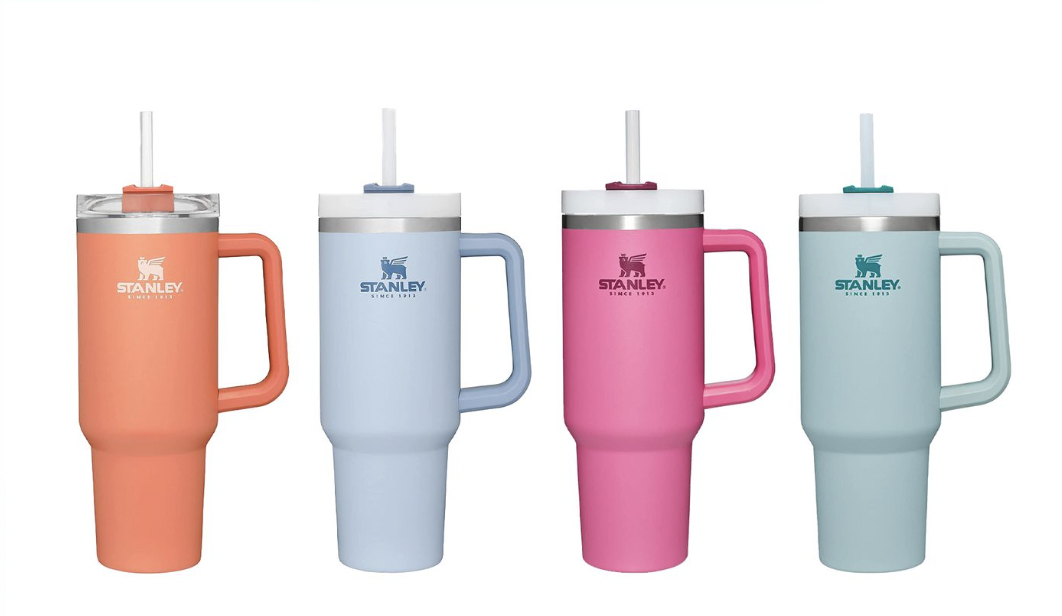Woman Arrested for Allegedly Stealing $2,500 of Stanley Drinking Cups
Arrest is the latest episode in the viral craze over the water bottles
The Stanley cup craze has taken a criminal turn.
A 23-year-old Sacramento, Calif., woman was arrested after allegedly stealing nearly $2,500 worth of Stanley cups from a retail store, local police said. The woman allegedly filled her shopping cart with Stanley Quenchers—the insulated cups that have thrown social-media into a frenzy in recent months—and left without paying.
When police tracked her down, they found her car filled with 65 of the cups, according to Lt. Chris Ciampa of the Roseville Police Department. She was arrested on charges of grand theft and driving under the influence, Ciampa said.
The arrest was the latest episode in the viral craze over the water bottles. The stainless-steel tumblers—the popular, 40-ounce version of which sells for $45—have become a status symbol for many women and teens, sparking chaos at retailers and launching a resale market where certain colors sell for more than $200 apiece. The hashtag #stanleytumbler has more than a billion views on TikTok and has been used more than 180,000 times on Instagram.
Stanley, which has been in business for more than a century, has long been a popular brand for hikers, teachers and construction workers. But as the Quencher’s popularity skyrocketed in recent years, its maker capitalised on the new demand with collaborations and a wider, pastel-driven colour palette.
“We were a brand that was a $70 million brand that appealed to guys with a green bottle that was 107 years old and is one of the greatest products in history,” Stanley’s president, Terence Reilly, said in an interview earlier this month. He added: “There was a big opportunity to reposition the brand and appeal to new consumers. And that’s just what we set out to do in 2020.”
In 2022, the company said there was a 150,000-person long wait list for the Quencher and sales had more than tripled from the prior year.
The cups have sparked a collectors’ craze, with devotees amassing dozens of colors and fighting over limited-edition releases. Ahead of one such release, for the Starbucks x Stanley pink Quencher, shoppers camped overnight outside Target locations to ensure they got a cup. The products sold out in minutes at some stores, and a viral video of frenzied shoppers rushing a display in one location sparked consternation online.
Those limited-edition pink cups, which are currently not available on Target or Stanley’s website, are now retailing for hundreds of dollars on resale sites like eBay and StockX.
Ciampa, the police lieutenant, said he believes the woman likely intended to resell online the 65 cups that were in her car. The department warned any potential thieves against repeating her behavior.
“While Stanley Quenchers are all the rage, we strongly advise against turning to crime to fulfil your hydration habits,” it said in a statement.
This stylish family home combines a classic palette and finishes with a flexible floorplan
Just 55 minutes from Sydney, make this your creative getaway located in the majestic Hawkesbury region.
Continued stagflation and cost of living pressures are causing couples to think twice about starting a family, new data has revealed, with long term impacts expected
Australia is in the midst of a ‘baby recession’ with preliminary estimates showing the number of births in 2023 fell by more than four percent to the lowest level since 2006, according to KPMG. The consultancy firm says this reflects the impact of cost-of-living pressures on the feasibility of younger Australians starting a family.
KPMG estimates that 289,100 babies were born in 2023. This compares to 300,684 babies in 2022 and 309,996 in 2021, according to the Australian Bureau of Statistics (ABS). KPMG urban economist Terry Rawnsley said weak economic growth often leads to a reduced number of births. In 2023, ABS data shows gross domestic product (GDP) fell to 1.5 percent. Despite the population growing by 2.5 percent in 2023, GDP on a per capita basis went into negative territory, down one percent over the 12 months.
“Birth rates provide insight into long-term population growth as well as the current confidence of Australian families,” said Mr Rawnsley. “We haven’t seen such a sharp drop in births in Australia since the period of economic stagflation in the 1970s, which coincided with the initial widespread adoption of the contraceptive pill.”
Mr Rawnsley said many Australian couples delayed starting a family while the pandemic played out in 2020. The number of births fell from 305,832 in 2019 to 294,369 in 2020. Then in 2021, strong employment and vast amounts of stimulus money, along with high household savings due to lockdowns, gave couples better financial means to have a baby. This led to a rebound in births.
However, the re-opening of the global economy in 2022 led to soaring inflation. By the start of 2023, the Australian consumer price index (CPI) had risen to its highest level since 1990 at 7.8 percent per annum. By that stage, the Reserve Bank had already commenced an aggressive rate-hiking strategy to fight inflation and had raised the cash rate every month between May and December 2022.
Five more rate hikes during 2023 put further pressure on couples with mortgages and put the brakes on family formation. “This combination of the pandemic and rapid economic changes explains the spike and subsequent sharp decline in birth rates we have observed over the past four years,” Mr Rawnsley said.
The impact of high costs of living on couples’ decision to have a baby is highlighted in births data for the capital cities. KPMG estimates there were 60,860 births in Sydney in 2023, down 8.6 percent from 2019. There were 56,270 births in Melbourne, down 7.3 percent. In Perth, there were 25,020 births, down 6 percent, while in Brisbane there were 30,250 births, down 4.3 percent. Canberra was the only capital city where there was no fall in the number of births in 2023 compared to 2019.
“CPI growth in Canberra has been slightly subdued compared to that in other major cities, and the economic outlook has remained strong,” Mr Rawnsley said. “This means families have not been hurting as much as those in other capital cities, and in turn, we’ve seen a stabilisation of births in the ACT.”
This stylish family home combines a classic palette and finishes with a flexible floorplan
Just 55 minutes from Sydney, make this your creative getaway located in the majestic Hawkesbury region.


















